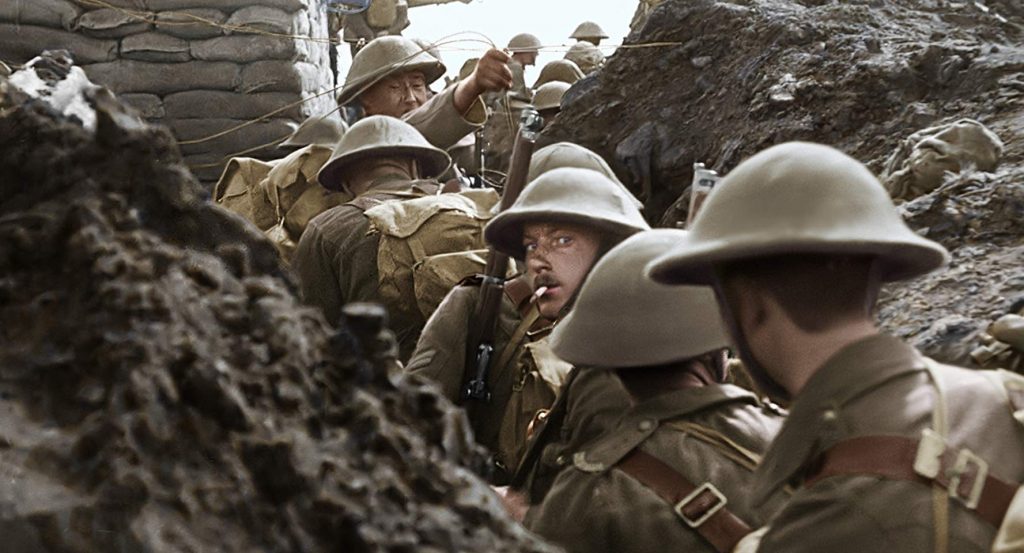Maybe there’s hope for us after all.
I had to make two attempts to see Peter Jackson’s documentary “They Shall Not Grow Old,” where the “Lord of the Rings” director took ragged and decrepit film footage of World War I and, like a cinematic Gandalf, transformed it into a crystal-clear, colorized, and thoroughly modern retelling of a part of history long forgotten.
Or so I thought until my first attempt to see the movie ended in failure, due to the show being sold out.
I did not believe I would have needed to buy an advance ticket to see something that was 100 years old. I thought there could only be a few dozen history nerds like me left in the wild and I would have had the theater practically to myself.
It took me years to get my daughter to even agree to look at a movie made before 1996. As I looked forlornly around the movie theater lobby wallowing in my failure to secure a ticket, I saw a bunch of people a lot younger than me holding tickets.
My inner grumpy old man lashed out at the ticket taker as I registered my astonishment wondering aloud how these people, who I hastily judged probably didn’t even know who Elvis Presley was, would want to see a movie composed entirely of archival footage that was now even more than 100 years old.
When I made my second, and successful, attempt to see this film, I had no better understanding of the appeal this film had for a younger audience. If I knew that secret I would be writing this article from my yacht. I’m not. Despite not deducing any deep insights into young movie audience demographics, I did have a better understanding of something else.
Remembering our past is a lost art but an art deserving of a renaissance. It would help serious Catholics manage their hopes, frustrations, and expectations if they looked at the current crisis inside the Church with a little historical context.
This is not to say that I, as a troubled and gloriously imperfect member of the Church, who is, to put it mildly, vexed by the current affairs that seem to splash onto headlines in print, website, and television on a regular basis, am the moral equivalent of a Marine charging through the thickets at the Battle of Belleau Wood in 1918, but sometimes it feels like it.
Just as Peter Jackson has given us a fresh reminder of those who have gone before us in history, it serves us well to keep that in mind when it comes to Church history. And just as there were many instances of bravery, cowardice, evil, and acts of grace in and outside the trenches of World War I, there too are similar examples in the crisis that confronts Mother Church.
And it is essential that we Catholics, we Christians, keep in mind that we have something those poor souls in the trenches of France did not. We have assurance of victory. It may not always look like it. I’m sure it didn’t look too victorious for early Christians in Rome or latter-day Christians in other parts of the world in other epochs.
The images Peter Jackson has restored in his film show young men, some mere boys, dealing with horrid trench conditions, finding themselves up to their elbows in mud, filth, rats, and the stench of death. The film includes actual recordings of World War I veterans voicing concern they might soon become a permanent part of that landscape.
Even though our eventual victory is confirmed in sacred Scripture, we don’t always let it sink in. We are also capable — think of the Cleveland Browns — of snatching defeat from the jaws of victory at any given moment.
The sexual sin crisis in the Church, which has been put back on the front burner with the meeting in Rome, will generate a lot of heat, but probably not much light. Things just don’t move that quickly with the Church. So, we must remain in our trenches, even if we find ourselves up to our elbows in mud and muck.
And unlike the film “They Shall Not Grow Old,” which is a valuable and important look behind us and an evaluation of goals and strategies not realized, our goal as a Church and as a faithful community is to look forward and never lose sight of our final and achievable objective.
Robert Brennan is a weekly columnist for Angelus online and in print. He has written for many Catholic publications, including National Catholic Register and Our Sunday Visitor. He spent 25 years as a television writer, and is currently the Director of Communications for the Salvation Army California South Division.
SPECIAL OFFER! 44 issues of Angelus for just $9.95! Get the finest in Catholic journalism with first-rate analysis of the events and trends shaping the Church and the world, plus the practical advice from the world’s best spiritual writers on prayer and Catholic living, along with great features about Catholic life in Los Angeles. Subscribe now!

